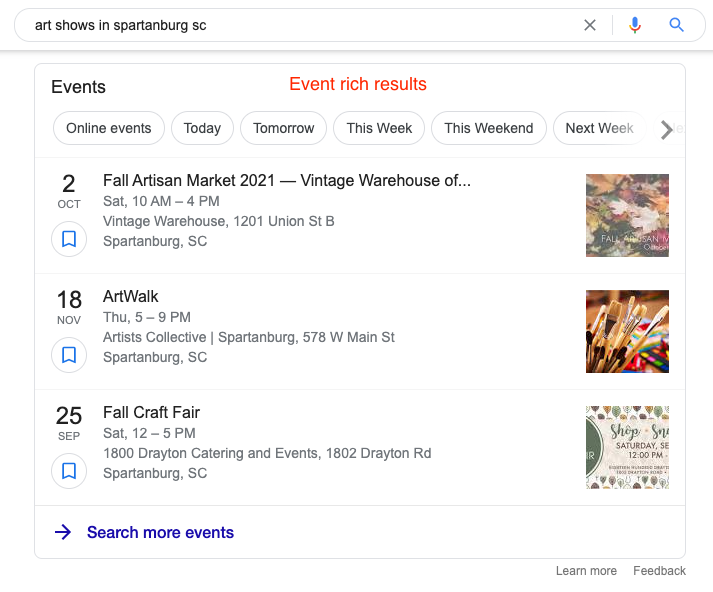
The New SEO: Using Schema to Attract More Users to Your Website
SEO and Content Strategy | 5 min read
Schema markup? Structured data? If these terms sound like a foreign language to you, don’t worry—you’re not alone! Schema markup is an important part of technical SEO, but it is very—you guessed it—technical. It’s not something to be ignored, though. Schema can have a big impact on organic search results, and it’s worth taking the time to figure out which schema markups your website needs to boost your SEO.
In this blog we’ll help you understand:
- What schema and structured data markup is
- Why schema is important
- Some commonly used schema markups and when they’re useful
- How schema can impact your business growth
What is schema structured data?
Structured data is a standardized format for communicating specific information about a webpage. Schema markup is a common structured data vocabulary that search engines use to help them better understand the information on websites in order to deliver more relevant search results. Schema markups are added to the HTML code of the website, which means it isn’t visible to users. Essentially, schema allows a search engine (like Google) to better understand what your website is about and then display that information more accurately in search results.
One way to think about schema is as a language. Search engine bots crawl your website to gather information about its content. They understand the text, but they might not fully comprehend the connections and conceptual meaning behind it because they are robots whose native language is code. Schema markup can be used to communicate with search engines in their native language to tell them exactly what type of information is on the page. This allows search engines to categorize the content correctly and showcase it effectively in search results.
For example, if you have a page on your website with the heading, “Hot Cross Buns,” the search engine would have to determine if your page is about a children’s nursery rhyme or a recipe for a delicious baked good. Schema markup can designate the content as a music recording or recipe, which makes it easier for search engines to categorize in search results.
Schema sounds complicated. Is it really that important?
You might ask, doesn’t Google already show websites in search results without the extra schema markup? Does my website really need schema? Your website can and will show up in organic search results without schema, but properly structured data will improve your website’s visibility and enhance its appearance in search results across all major search engines. Schema will also set you up for success as search-related technology continues to evolve.
Schema’s Impact on SEO
Adding extra code to your website that doesn’t change the visible appearance of the site may not seem like it’s worth the effort, but schema markup has become increasingly vital for successful SEO. Schema.org was founded by Google, Microsoft, Yahoo! and Yandex, so structured data markup must be important if the major search engines collaborated to develop their own vocabulary!
One reason that schema markup has become vital to SEO is that Google uses structured data to showcase information as rich results on the search results page. Rich results are special search result features and enhancements, such as an FAQ, events or recipe, that usually appear at the top of the search results page. This is prime real estate! Rich snippets not only push other organic results further down the page (and potentially out of sight), but they are proven to help click-through rates. Without schema, you might miss out on the opportunity to be showcased through features like images, reviews, FAQs, featured snippets, events, local pack results, and shopping results.
For example, you’re hosting an art show to benefit a local nonprofit organization, and you have all of the event info detailed on the website. By adding event schema markup to the web page, your art show would be eligible to appear as rich results in the events panel. This makes your event more visible for people searching for art shows in your area or similar events.

Additionally, voice-activated devices like Google Assistant rely heavily on structured data to identify and retrieve information relevant to spoken questions. This means that the majority of answers provided via voice search were marked up with some form of schema. A voice search study conducted by Semrush investigated the most essential ranking factors behind voice search, especially what influences Google Assistant’s answers. The study concluded that voice search answers come mainly from high-ranking organic results in the featured snippet position. Though they couldn’t determine which type of schema would most likely influence an answer being selected via voice search, the majority of the answer sources did use some type of schema.
There has been a lot of discussion within the SEO community about whether structured data affects website rankings in organic search results. There is no clear evidence that schema directly improves rankings. However, there are clear indications that rich results (most of which require schema) improve click-through rates in organic search results, which is a win for your website’s SEO.
Semantic Search and Schema
Search engine technology is continually evolving, and the most important ranking factors have changed quite a bit over the past decade. SEO used to be more concerned with backlinks and repetitive keyword usage, but now search engines are more concerned with user intent. They now prioritize semantic search, meaning their algorithms attempt to provide the most relevant search results based on the searcher’s intent by contextualizing keywords and understanding the conceptual meaning of content.
In order to provide the best semantic search results, Google prefers content that provides more in-depth coverage of a topic, incorporating multiple concepts that help the reader fully understand the big picture. This means it’s better to have long-form content on your website that fully covers a concept rather than a short blurb focused on a single primary keyword.
So, what does semantic search have to do with schema, and why is it important? Google’s machine learning can understand multiple concepts on a page, but adding schema to your long-form content provides additional clues about the meaning of the content. Schema makes it easier for Google to understand and contextualize the content in order to generate the most relevant search results based on a user’s intent.
SEO Benefits of Schema
To sum up, here are some ways schema impacts your website SEO:
- Properly structured data will improve your website’s visibility and enhance its appearance in Google search results.
- Schema allows your content to appear in Google’s rich results. Rich snippets improve click-through rates in organic search results.
- The majority of answers provided by voice-activated devices like Google Assistant are marked up with some form of schema.
- Schema helps Google contextualize your content for semantic search results.
Commonly Used Types of Schema
There are lots of different types of schema (find the full list on schema.org), but you probably don’t need to mark up your website with every possible option. Some types of schema are more important than others, especially depending on your business.
Some commonly used types of schema include:
- Articles
- Events
- FAQ
- Job Postings
- Local Business
- Organizations
- Products
- Reviews / Aggregate Rating
- Recipes
Where to Start With Schema
All businesses should start with adding Organization schema to their website homepage or “About” page, including name, address and logo. This might seem unnecessary but Google likes confirmation in order to serve up the most accurate results quickly.
Local Business schema is a subtype of Organization schema that is vital for all local businesses to implement. It is used to designate a particular physical business or branch of an organization and can also include your business hours. Add this to your online directories to-do list.
Another commonly used type of schema is FAQ. If you have a page dedicated to frequently asked questions, marking this up with FAQ schema will make your content eligible to appear in Google’s rich results. If users find the answer they’re looking for in the FAQ panel, they may not even scroll down the page to see the rest of the organic results.
Job Posting schema has recently become more important if you’re looking to fill open positions in your company. Google now displays job postings directly on the search results page by gathering information from employers and career sites across the web. They integrate directly with some third-party job providers, like ZipRecruiter, to source this information, or you can add job posting schema to your website to directly integrate with Google. Learn more about optimizing online job posts on our blog.
How To Get Started With Schema Markup
Since schema is code added to the HTML of your website, you will likely need the help of a programmer to implement it. You should work closely with your web developer to identify the types of schema you need and ensure the information is correct.
Once you’ve added schema to your website, use the Schema Markup Validator to test your structured data. You can also use Google’s Rich Results Test to see which Google rich results can be generated by the schema on your page.
Why Schema Matters
At the end of the day, we know businesses are focused on growth and finding new leads to support that growth. Schema might seem too technical and time consuming to be worth the effort, but it can make a difference for your business growth. Schema is a tool that will help you build stronger SEO. Continual improvement to SEO translates to more visibility and traffic to your website, which results in more leads for your business.
Hopefully, you now have a better understanding of what schema is and why it’s important. If you’re feeling a little overwhelmed, don’t fret! The ever-changing world of SEO can be complicated, but ALINE is here to help. If you’re interested in learning more about what types of schema your website needs, we’d love to chat.
